Overview
B2B branding can often feel like a daunting challenge, can’t it? Many tech startup founders struggle to carve out a distinct identity in a crowded marketplace. This struggle can lead to feelings of frustration and uncertainty, especially when it comes to building customer loyalty. Without a strong brand presence, it’s tough to foster trust and visibility, which are essential for business growth.
Imagine pouring your heart and soul into your product, only to find that potential customers overlook it. This is a common pain point that many face, and it can be disheartening. The implications are significant: without effective branding strategies, you may see stagnant revenue and dwindling customer retention. It’s a tough reality, but you’re not alone in this journey.
However, there is hope. By focusing on personalized experiences and crafting a compelling value proposition, you can transform your approach to branding. Building meaningful connections with your audience is not just a strategy; it’s a necessity in today’s competitive landscape. At RNO1, we understand the emotional and professional needs of startup founders like you. We’re here to support you in creating a brand that resonates deeply with your customers.
Let’s work together to nurture your brand identity, ensuring it reflects your values and vision. By doing so, you’ll not only enhance your visibility but also cultivate trust and loyalty among your customers. Remember, every great brand starts with a story, and we’re excited to help you tell yours.
Introduction
In the competitive world of business-to-business (B2B) marketing, many companies find themselves struggling to carve out a unique identity. It’s a common challenge—how do you stand out in a sea of competitors? This struggle can lead to feelings of frustration and uncertainty, especially when the goal is to build trust and loyalty with clients.
Imagine pouring your heart into your business, only to feel overshadowed by others. It’s disheartening, isn’t it? But you’re not alone in this journey. Many businesses face the same hurdles, and it’s essential to recognize that these challenges can be overcome.
This article explores the vital components of B2B branding, shedding light on how a well-defined strategy can not only drive growth but also strengthen customer relationships. By understanding what truly sets successful B2B brands apart, you can begin to navigate this complex landscape with confidence.
So, what are the key elements that can elevate your brand in today’s market? Let’s delve into this together, and discover the supportive solutions that can help you thrive.
Define B2B Branding and Its Significance
In the world of B2B branding, many businesses struggle to carve out a distinct identity and reputation. This challenge can feel overwhelming, especially when trying to promote products or services to other enterprises. Unlike B2C marketing, which often leans on emotional appeal, B2B branding focuses on building trust, establishing authority, and demonstrating value through expertise and reliability.
Imagine the impact of a strong B2B identity on customer loyalty. Studies show that 80% of business buyers are more inclined to purchase from companies that offer personalized experiences. This statistic highlights a significant pain point: without a tailored approach, businesses risk losing potential customers.
But there’s hope. Successful marketing strategies, like RNO1's Return On Design & Digital (RODD) approaches, can lead to higher conversion rates. Companies that prioritize visibility and authenticity often see a remarkable increase in engagement. A strong B2B branding not only fosters sustainable business growth but also establishes your company as a trusted partner in its industry.
As a testament to this, consider that a staggering 83% of B2B content focuses on building brand awareness and interest. This underscores the vital role of B2B branding in B2B contexts. By nurturing your brand and focusing on personalized experiences, you can create lasting connections with your clients. Together, let’s explore how RNO1 can support you in this journey.
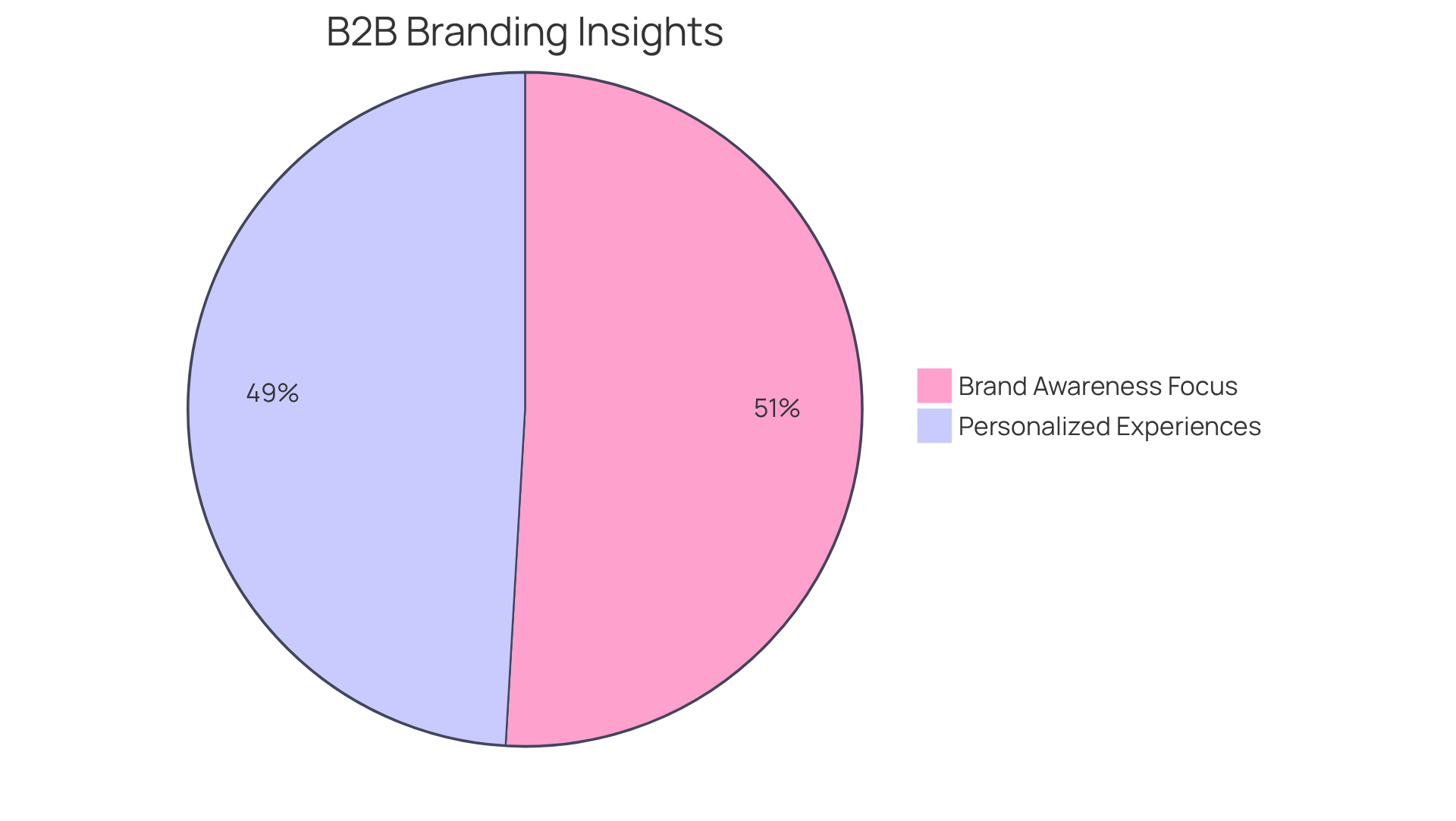
Differentiate B2B Branding from B2C Branding
Navigating B2B branding can feel overwhelming, especially for tech startup founders. The challenge lies in understanding that B2B identity is fundamentally different from B2C identity. In B2B branding, the audience consists of companies and organizations, often involving multiple stakeholders in the decision-making process and lengthy sales cycles. This contrasts sharply with B2C marketing, where individual consumers typically make quicker purchasing decisions, often driven by emotional factors.
This distinction can lead to frustration. B2B marketing demands a focus on rationality and logic, emphasizing product specifications, return on investment (ROI), and service reliability. Meanwhile, B2C marketing often captivates audiences through emotional storytelling and lifestyle aspirations. This divergence can leave B2B marketers feeling isolated, as they strive to connect with their audience in a meaningful way.
Building relationships and trust is paramount in the context of B2B branding. Unlike B2C, where immediate sales may take precedence, B2B branding must prioritize establishing a strong reputation and credibility. This is where RNO1 shines. Their strategic rebranding of Founder's Haven exemplifies how empowering contemporary founders for digital success can resonate deeply with a business audience. It’s about fostering connections that last.
For tech startups, implementing effective B2B branding strategies that nurture long-term relationships can lead to enhanced customer loyalty and sustained growth in a competitive marketplace. RNO1's performance marketing expertise, highlighted in their case study with Cirkul, underscores the importance of utilizing channels like LinkedIn and trade shows to engage with decision-makers.
If you’re feeling the weight of these challenges, remember that you’re not alone. RNO1 is here to support you in navigating this complex landscape, helping you build the connections that matter most.
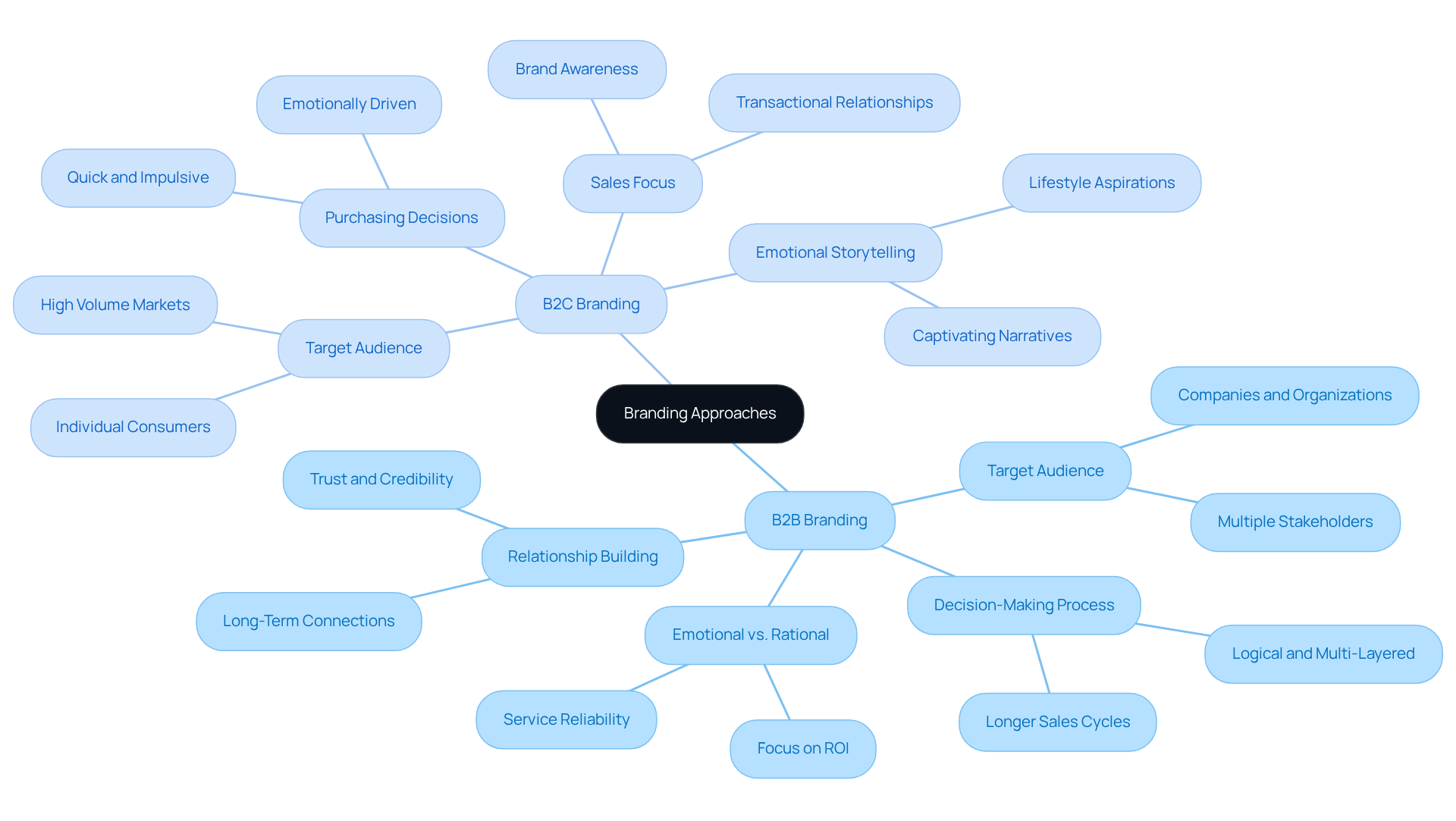
Identify Key Components of Effective B2B Branding
Effective b2b branding can indeed feel overwhelming, can’t it? Many businesses struggle to carve out their unique identity in a crowded marketplace. This challenge often leads to frustration, as they find it hard to stand out and connect with their audience. But there’s hope! By focusing on a few key components, businesses can not only enhance their visibility but also foster meaningful relationships with their clients.
-
Brand Identity is where it all begins. Think about the logos, color palettes, and typography that represent your brand. A cohesive brand identity helps you stand out and ensures that your business is easily recognizable. Consistency in marketing can lead to a revenue boost of 10% to 20% for 60% of firms. At RNO1, we understand the importance of a results-driven approach. We’re here to help you create a brand identity that’s not just visually appealing but also leads to measurable success.
-
Next, let’s talk about your Value Proposition. It’s essential to clearly communicate what makes your business unique. This means highlighting the benefits and solutions you offer to your clients. A strong value proposition can significantly influence purchasing decisions; in fact, 60% of B2B buyers may finalize purchases based solely on digital content. At RNO1, we’re committed to enhancing our clients’ value propositions through design-driven solutions that resonate in the marketplace.
-
Now, consider your Content Strategy. High-quality, informative content that addresses your audience’s needs is vital for establishing authority and trust. This could be anything from whitepapers to blog posts. Did you know that 60% of B2B organizations use SEO to generate leads through well-crafted content? At RNO1, we showcase our successful collaborations, like our work with Spring Labs and RentMethod, to demonstrate how effective content can drive results.
-
Customer Engagement is another crucial aspect. Building relationships through personalized communication and responsive service fosters loyalty and encourages repeat business. Engaging customers effectively can lead to a 47% increase in purchase size for nurtured leads compared to non-nurtured ones. Plus, 84% of B2B buyers use social media during their purchase decision process, highlighting its role in relationship-building. RNO1’s innovative strategies for scaling omnichannel ambassador programs are designed to enhance customer engagement and drive e-commerce success.
-
Finally, let’s explore Thought Leadership. Positioning your company as an industry leader through insights and innovative solutions can enhance credibility and attract new clients. Brands that share valuable knowledge are more likely to be trusted; in fact, 81% of consumers need to trust a brand before considering a purchase. At RNO1, our commitment to thought leadership shines through in our digital identity and UX design collaborations, as we strive to provide cutting-edge solutions that truly resonate with our clients’ needs.
Integrating these components into your B2B branding strategy not only enhances your market presence but also fosters sustainable growth. At RNO1, we pride ourselves on our successful partnerships and results-oriented methodologies. Our emphasis on Return On Design & Digital (RODD) ensures that every design choice leads to quantifiable results for our clients. Together, let’s navigate the complexities of branding and create a strategy that truly reflects your business’s unique story.
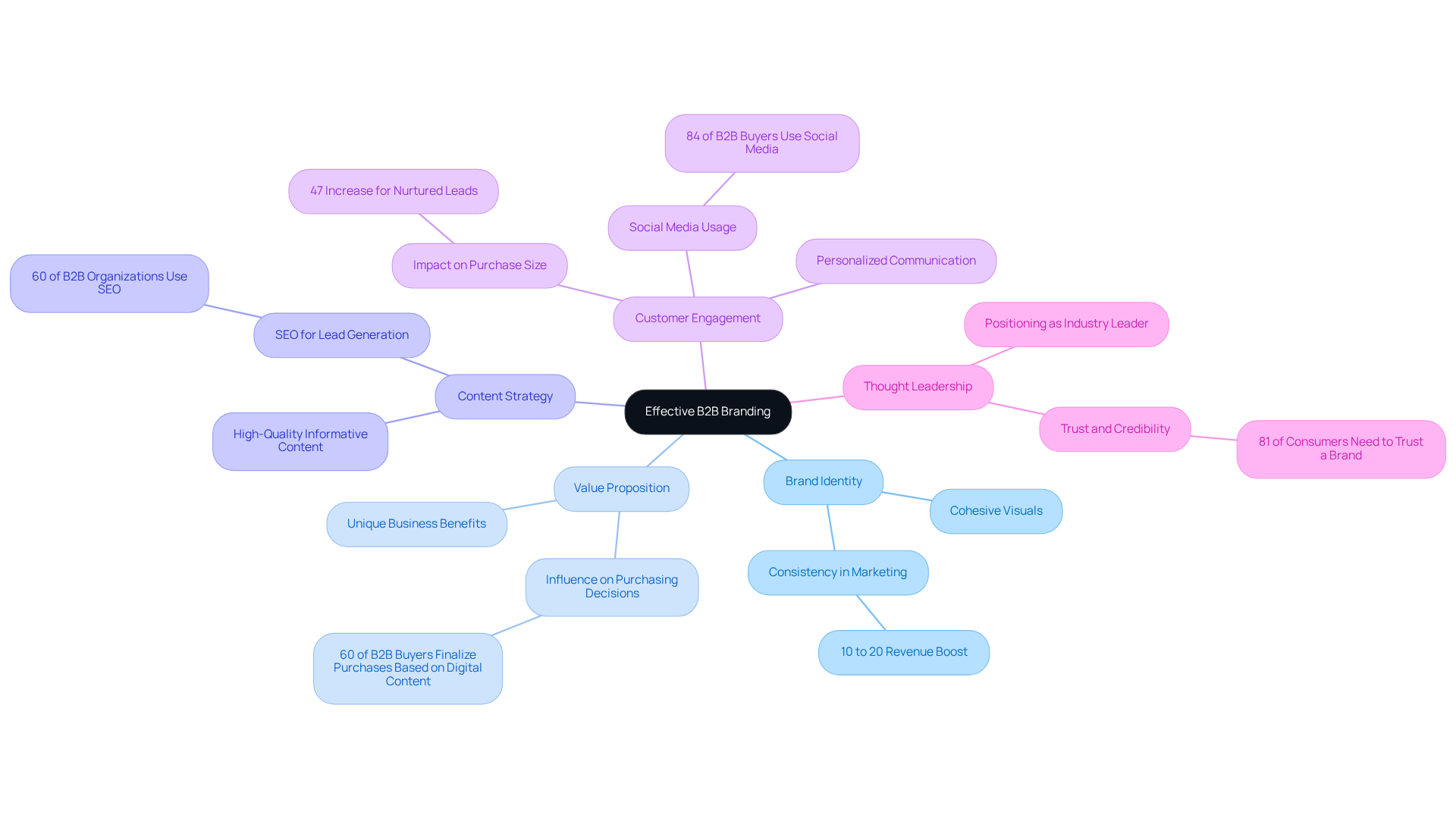
Examine the Impact of B2B Branding on Business Growth
For many tech startup founders, building a strong B2B branding can feel like a daunting challenge. It’s not just about having a logo or a catchy tagline; it’s about creating a meaningful connection with your audience. When businesses lack a clearly defined identity strategy, they often struggle to stand out in a crowded marketplace, which can lead to stagnating revenue growth. In fact, studies reveal that B2B branding for firms with a cohesive identity can boost their revenue by as much as 23%.
Imagine the relief of knowing that a strong brand not only attracts new clients but also fosters customer loyalty. When customers trust a brand, they’re more likely to stick around, which is crucial for long-term success. Take RNO1's tactical rebranding of Founder's Haven, for instance. This initiative empowers contemporary founders to achieve digital success through innovative marketing and performance strategies. It’s a testament to how effective branding can transform a business’s trajectory.
Moreover, effective marketing can significantly enhance market positioning, allowing companies to command premium pricing and lower customer acquisition costs. RNO1's Ryde initiative, which focuses on scaling omnichannel brand ambassador programs, showcases creative ways to engage communities and leverage influencer marketing. This not only boosts e-commerce engagement but also builds a supportive network around your brand.
In today’s competitive landscape, companies that prioritize B2B branding are better equipped to navigate market challenges and seize growth opportunities. Additionally, those with strong educational content can reduce onboarding-related churn by 15-20%. And let’s not forget about the impact of dedicated customer success managers (CSMs); they can lead to up to 25% higher net revenue retention (NRR) compared to those without.
Enhancing customer loyalty can also translate into increased profits, with potential gains ranging from 25% to 95%. This highlights the financial benefits of adopting strong marketing approaches. At RNO1, we understand these challenges and are here to support you in building a brand that resonates with your audience, fostering both trust and loyalty.
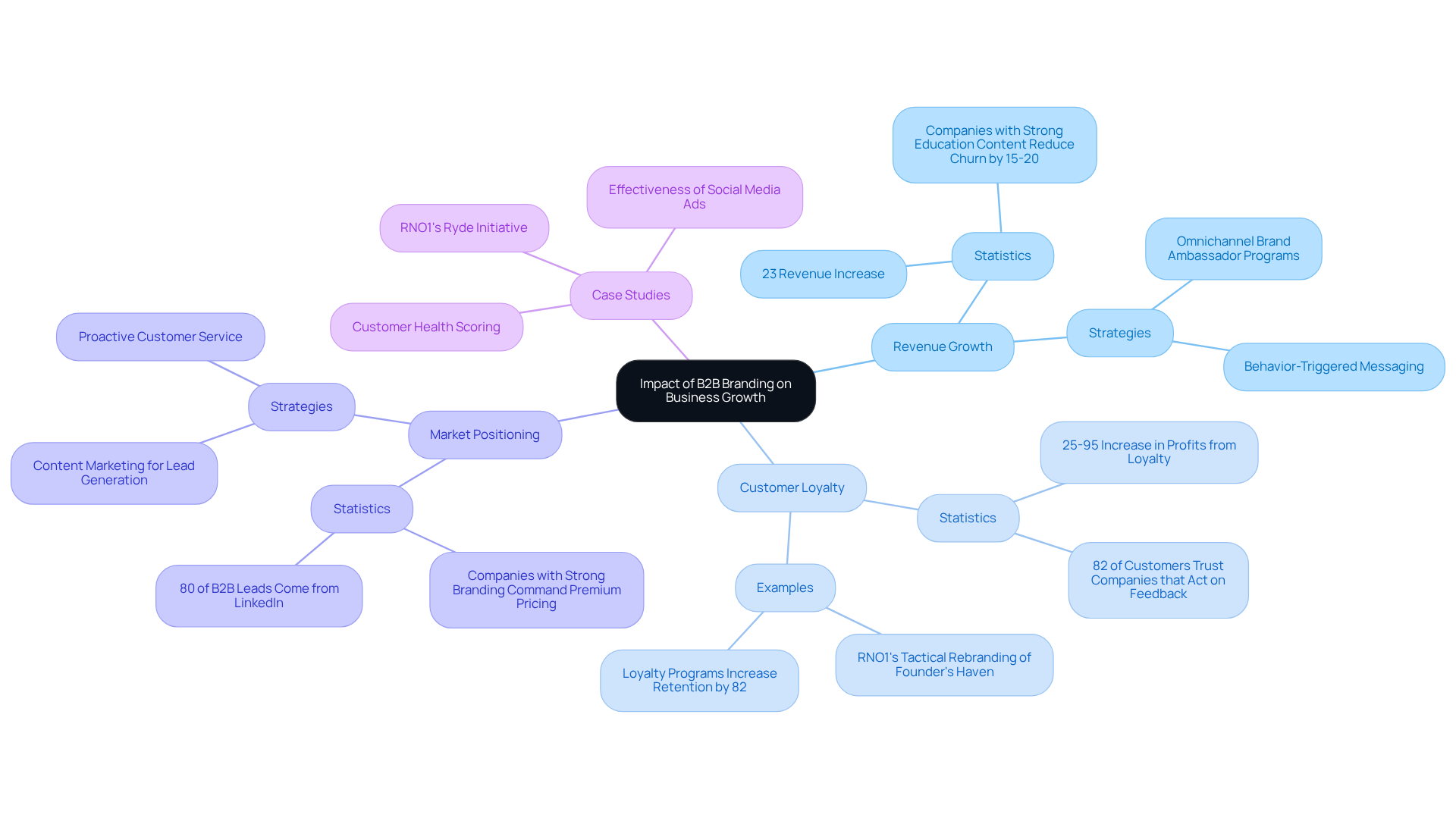
Future Trends in B2B Branding
As we look towards the future, many B2B marketers face the challenge of adapting to evolving B2B branding strategies. It can feel overwhelming, especially with the rapid pace of change. But there’s hope. Here are some trends that can guide your journey:
-
Hyper-Personalization: With advancements in data analytics and AI, companies are finding ways to customize their messaging and offerings to meet the specific needs of individual clients. Imagine the impact—over 77% of companies that implement personalized marketing strategies report an increase in market share. This level of customization not only enhances customer engagement but also fosters loyalty and drives revenue growth. It’s a critical focus for B2B marketers looking to connect on a deeper level.
-
Sustainability: Many companies are becoming more aware of their ecological footprint. Those that emphasize sustainability in their practices often find a stronger connection with clients. By effectively communicating sustainability efforts, businesses can enhance their reputation and build trust—an essential element in today’s market.
-
Emotional Branding: Traditionally, B2B branding focused on logic, but there’s a growing recognition of the importance of emotional connections in business relationships. Brands that evoke trust and loyalty through storytelling can gain a competitive edge. Emotional branding is essential in B2B branding as it fosters deeper connections with clients, making them feel valued and understood.
-
Digital Transformation: The shift towards digital platforms is here to stay. Companies must improve their online presence and engagement strategies. With video content expected to represent 82% of all internet traffic by 2025, it’s crucial to utilize digital channels effectively to capture audience attention.
-
Influencer Marketing: Utilizing industry influencers to establish credibility and access new audiences is becoming increasingly significant in B2B promotional efforts. RNO1's creative approaches, like the Ryde initiative, highlight the importance of community involvement and influencer collaborations in boosting e-commerce interaction. Engaging with thought leaders can provide valuable perspectives and enhance brand visibility, making it a strategic element of future marketing efforts.
As Peter Allen Clark wisely notes, 'The best strategies combine both—capturing demand and creating it.' This underscores the importance of integrating influencer marketing into broader B2B branding strategies. R is for real results, and RNO1's commitment to design-driven solutions further strengthens its approach to achieving measurable success. Together, we can navigate these trends and create meaningful connections that resonate with your audience.
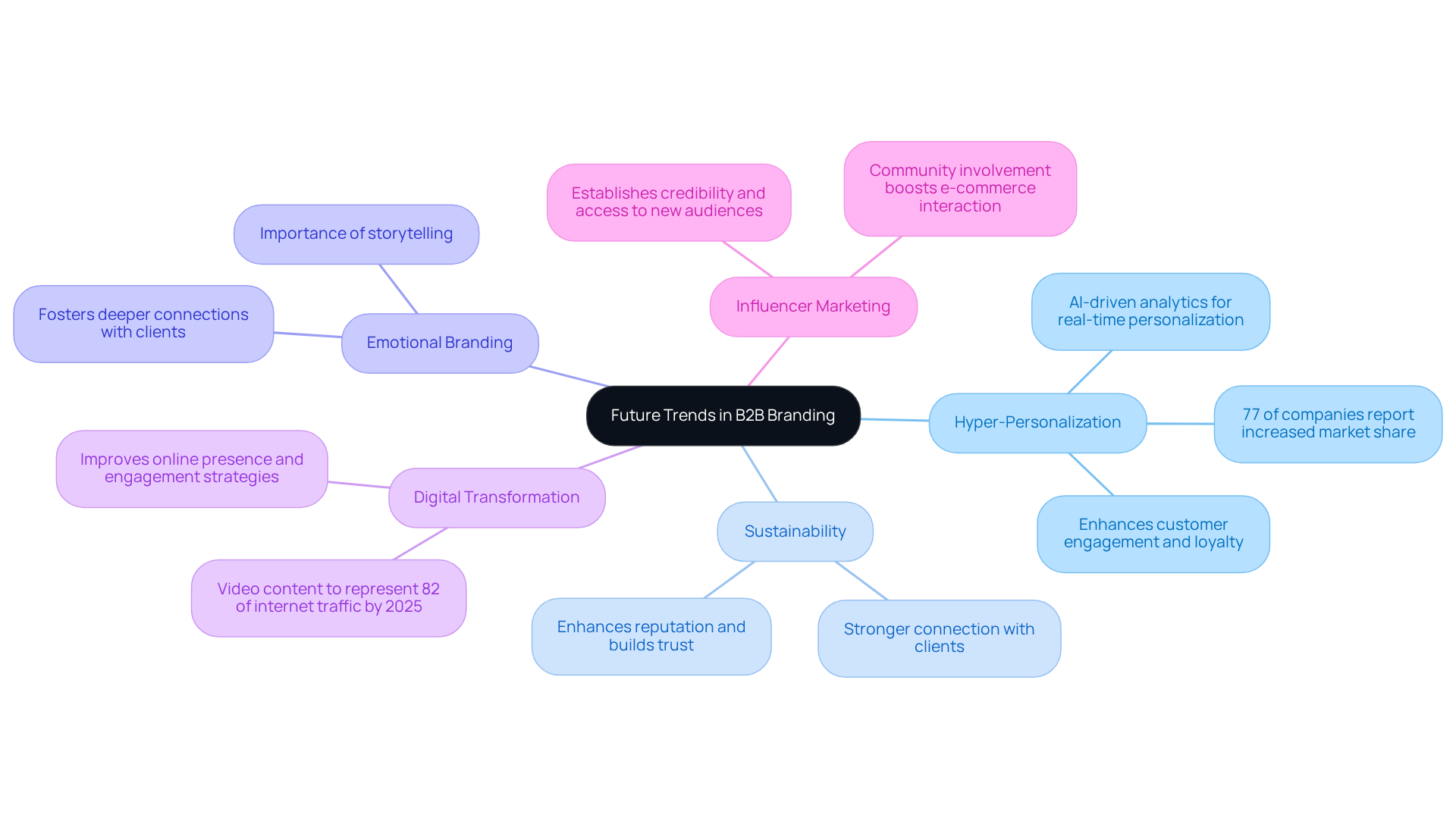
Conclusion
Understanding the complexities of B2B branding can feel overwhelming, especially for businesses striving to carve out a strong identity in a crowded marketplace. It’s not just about standing out; it’s about building trust, authority, and expertise. These elements are what truly differentiate B2B branding from B2C strategies. Tailoring your approach to resonate with other enterprises is essential. A thoughtfully crafted B2B brand doesn’t just attract clients; it nurtures loyalty, paving the way for sustainable growth.
Key components like brand identity, value proposition, content strategy, customer engagement, and thought leadership are vital in shaping effective B2B branding. By focusing on these elements, businesses can enhance their visibility and forge meaningful connections, establishing themselves as credible leaders in their industry. The impact of a strong B2B brand is significant—studies show that companies investing in cohesive branding strategies often see substantial revenue increases and improved customer retention.
As the B2B marketing landscape evolves, it’s crucial to embrace trends like hyper-personalization, sustainability, emotional branding, digital transformation, and influencer marketing. These strategies not only meet the changing expectations of business clients but also position companies to thrive in an interconnected world. By prioritizing B2B branding today, you’re laying the groundwork for future success, reinforcing the importance of creating a brand that truly resonates with your audience. Remember, you’re not alone in this journey; together, we can navigate the path to a stronger, more impactful brand.
Frequently Asked Questions
What is B2B branding and why is it significant?
B2B branding involves creating a distinct identity and reputation for businesses that sell products or services to other enterprises. Its significance lies in building trust, establishing authority, and demonstrating value through expertise and reliability, which are crucial for customer loyalty and sustainable business growth.
How does B2B branding differ from B2C branding?
B2B branding focuses on companies and organizations as the audience, often involving multiple stakeholders and longer sales cycles. In contrast, B2C branding targets individual consumers who typically make quicker purchasing decisions influenced by emotional factors. B2B emphasizes rationality, product specifications, and ROI, while B2C often relies on emotional storytelling.
What impact does a strong B2B identity have on customer loyalty?
A strong B2B identity can significantly enhance customer loyalty, as studies show that 80% of business buyers prefer companies that offer personalized experiences. This tailored approach helps in creating lasting connections with clients.
What are some effective strategies for B2B branding?
Effective B2B branding strategies include focusing on visibility and authenticity, nurturing personalized experiences, and building strong relationships. Utilizing performance marketing and engaging decision-makers through channels like LinkedIn and trade shows are also essential.
Why is building trust important in B2B branding?
Building trust is paramount in B2B branding because it establishes a strong reputation and credibility. Unlike B2C, where immediate sales may be prioritized, B2B branding aims for long-term relationships that foster loyalty and sustained growth.
How can RNO1 assist businesses in B2B branding?
RNO1 offers support in navigating the complexities of B2B branding by implementing effective strategies, enhancing visibility, and fostering connections that matter. Their expertise is demonstrated through successful case studies, such as the strategic rebranding of Founder's Haven and performance marketing efforts with Cirkul.




